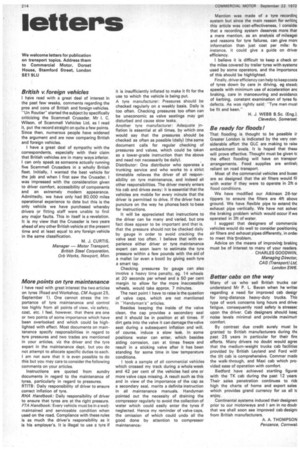More points on tyre maintenance
Page 214

If you've noticed an error in this article please click here to report it so we can fix it.
have read with great interest the two articles on tyres (Road and Workshop, CM August 25, September 1). One cannot stress the importance of tyre maintenance and control too highly from all points of view, viz safety, cost, etc. I feel, however, that there are one or two points of sonic importance which have been overlooked and which could be highlighted with effect. Most documents on maintenance specify responsibilities in regard to tyre pressures and two trades are mentioned in your articles, viz the driver and the tyre expert in the maintenance dept, but you do not attempt to allocate specific duties to each. I am not sure that it is even possible to do this but you may care to consider the following comments on your articles.
Instructions are quoted from sundry documents in regard to the maintenance of tyres, particularly in regard to pressures. RTITB: Daily responsibility of driver to ensure correct inflation of tyre.
RHA Handbook: Daily responsibility of driver to ensure that tyres are at the right pressure. FTA Handbook; Every vehicle must be in a wel(maintained and serviceable condition when used on the road. Compliance with these rules is as much the driver's responsibility as it is his employer's. It is illegal to use a tyre if it is insufficiently inflated to make it fit for the use to which the vehicle is being put.
A tyre manufacturer: Pressures should be checked regularly an a weekly basis. Daily is too often. Checking pressures too often can be uneconomic as valve seatings may get disturbed and cause slow leaks.
Another tyre manufacturer: Adequate inflation is essential at all times, by which one would say that the pressures should be checked as often as possible (daily) (the same document calls for regular checking of pressures and valves, which could be taken as a lower-grade instruction than the above and need not necessarily be daily).
Distributor: One distributor who operates a trunking service and who works to a strict timetable relieves the driver of all responsibility on tyre maintenance, and indeed all other responsibilities. The driver merely enters his cab and drives away; it is essential that the vehicles are mobile for every minute that the driver is permitted to drive. If the driver has a puncture on the way he phones back to base for instructions.
It will be appreciated that instructions to the driver can be many and varied, but one fact does appear to be important and that is, that the pressure should not be checked daily by gauge in order to avoid cracking the valve seat too often. I believe that with experience either driver or tyre maintenance expert can soon learn to estimate the tyre pressure within a few pounds with the aid of a mallet (or even a boot) by giving each tyre a smart tap.
Checking pressures by gauge can also involve a heavy time penalty, eg. 14 wheels at 20 seconds per wheel and a 50 per cent margin to allow for the more inaccessible wheels, would take approx. 7 minutes.
The next point I have to raise isthe question of valve caps, which are not mentioned in "Handyman's" articles.
Besides keeping the inside of the valve clean, the cap provides a secondary seal and it should be in position at all times. If dirt gets into the valve it can damage the valve seat during a subsequent inflation and will, of course, induce a slow leak. In some positions water can enter, which besides aiding corrosion, can at times freeze and result in a sticking valve after it has been standing for some time in low temperature conditions.
I took a sample of all commercial vehicles which crossed my track during a whole week and 42 per cent of the vehicles had one or more valve caps missing. A result such as this and in view of the importance of the cap as a secondary seal, merits a definite instruction in all maintenance manuals. Handyman pointed out the necessity of draining the compressor regularly to avoid the collection of water which could easily enter the tyres if neglected. Hence my reminder of valve caps, the omission of which could undo all the good done by attention to compressor maintenance.. Mention was made of a tyre recordinc system but since the main reason for writinc this article was cost-effectiveness, 1 considei that a recording system deserves more thar a mere mention, as an analysis of mileagei and reasons for tyre failures, can give more information than just cost per mile: fo instance, it could give a guide on driver efficiency.
I believe it is difficult to keep a check on the miles covered by trailer tyres with systems used by some operators, and the importance of this should be highlighted.
Finally, driver efficiency can help to keep costs of tyres down by care in driving, eg stead) speeds with minimum use of acceleration anc braking, care in manoeuvring and avoidanc( of kerbing, constant examination of tyres fo defects. As was rightly said: -Tyre men must be fit and keen."
H. J. WEBB B.Sc. lEngj, Clevedon, Somerset.
































































































































































































































































































































































































































































































































